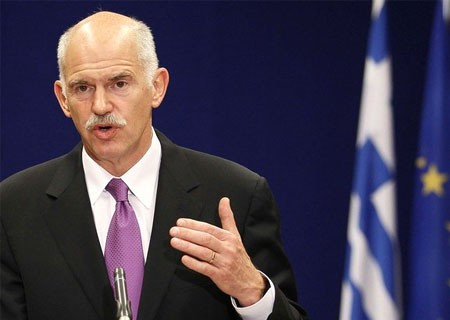Greek Referendum Shocks Euro Zone Leaders as Markets Plunge

Prime Minister George Papandreou's shock announcement Monday night that Greece's bailout plan will be put to referendum has been coldly received by German Chancellor Angela Merkel and French President Nicolas Sarkozy, bringing accusations the move will intensify the euro zone crisis.
Stock markets across Europe reeled after the Greek announcement. The FTSE 100 in London traded 2.5 per cent lower, the DAX in Frankfurt fell 3.8 per cent and the CAC-40 in Paris dropped 3.3 per cent.
Earlier, the Nikkei in Tokyo closed down 1.7 per cent and the Hang Seng in Hong Kong closed down 2.5 per cent.
Papandreou's referendum announcement came after euro zone leaders agreed last week to lend Greece a second 130 billion-euro bailout and write down 50 per cent of its mounting debt. In return the Greek government is expected to implement harsh spending cuts, which has angered the population.
The austerity measures taken by the Papandreou government have led to massive and violent protests and weakened the ruling Socialist party.
Following a set of defections from his own party, the prime minister, who has 153 deputies in the 300-seat parliament, has insisted he needed more political backing to implement the new fiscal measures and reforms.
"The plan of initiatives calls for a confidence vote," Papandreou told his Socialist members in Parliament, just before he announced a referendum would also be held on the EU deal.
"The command of the Greek people will bind us," he said.
"Do they want to adopt the new deal, or reject it? If the Greek people do not want it, it will not be adopted," the prime minister added.
Finance Minister Evangelos Venizelos also said the referendum was also a response to domestic political opposition.
"Even such a deal is placed in question by some," Venizelos told Parliament.
The new deal was reached after months of efforts and talks and also includes measures aimed at boosting the banking system, helping other struggling euro zone states and expanding the European bailout funds.
In recent months, Sarkozy and Merkel have played a crucial role in trying to resolve the euro zone crisis and Merkel's centre-right coalition was said to be "irritated" by Papandreou's announcement.
"This sounds to me like someone is trying to wriggle out of what was agreed -- a strange thing to do," said Rainer Bruederle, parliamentary floor leader for the Free Democrats.
"One can only do one thing: make the preparations for the eventuality that there is a state insolvency in Greece and if it doesn't fulfil the agreements, then the point will have been reached where the money is turned off."
The announcement was also said to have angered Sarkozy. "The Greek move is irrational and even dangerous", a source close to the president told Le Monde.
Sources have also said that Paris, Berlin and the IMF only heard about the referendum when Papandreou announced it publicly.
The referendum is now set to take place in February, putting the plan announced last Thursday by Sarkozy and Merkel into doubt.
The move was also set to embarrass the G20 leaders who will meet Thursday in Cannes, France, as the crisis is now once again surrounded by uncertainty.
Analysts have also warned that with latest opinion poll showing a majority of Greeks opposing the bailout deal, a defeat is quite possible.
Lawmakers have also warned that a 'No' vote would lead to Papandreou's resignation, forcing the country into early elections.
The referendum initiative is also set to create further market volatility and analysts pointed out that the immediate market reaction had been negative as the euro extended losses against the dollar and tumbled by more than 2 per cent to a session low.
To be binding a Greek referendum, requires a minimum 40 per cent turnout on issues of "crucial national importance" and 50 per cent on a law that has already been voted in Parliament and "regulates a serious social issue," but it is not clear yet which option the Greek government would choose.
With the referendum now announced the next few months will be decisive as observers have insisted the outcome of the vote could determine whether Greece remains in the euro.
© Copyright IBTimes 2025. All rights reserved.





















